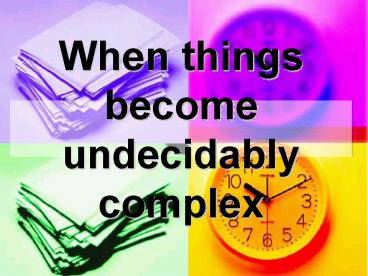When things become undecidably complex - PowerPoint PPT Presentation
Title:
When things become undecidably complex
Description:
... G del's second theorem: if a formal system of a certain kind is consistent, the ... Thus whatever choices we make from the range of all possibilities will be ... – PowerPoint PPT presentation
Number of Views:26
Avg rating:3.0/5.0
Title: When things become undecidably complex
1
When things become undecidably complex
2
- Within linear, one-dimensional thinking.
3
That is to say
1. A is A Law of Identity
2. A must be either A or not A Law of Contradiction
3. A cannot be both A and not A Law of Excluded Middle
4
Thus any and all problems should have an answer,
clearly and distinctly and fixed for all time.
5
- But what if we have n-dimensional thinking along
n-lines?
6
In other words, its a matter of
Timespace semiosis
7
0-Dimension
Timespace semiosis is processual, from
8
1-Dimension
To
9
2-Dimensions
To
10
3-Dimensions
To
11
4-dimensions
To
12
From I (a point 0-D nothingness, emptiness)
to Other (a line 1-D linearity, bivalence)
to I ? Other (a plane 2-D possibly 3-valued)
to Community (a cube 3-D many-valued) to
Cosmos (a hypercube 4D potentially ?-valued)
13
A variation on the theme
14
Of, if you wish, a 4-D Tessaract
15
(No Transcript)
16
Or a cube exploded Into a hypercube
17
Or, a 4-dimensional Klein-bottle
within 3-dimensional space
18
(No Transcript)
19
Now
The equation becomes
A is what it is (becoming) A is (now) not what it
is not A IS both what it is becoming and it is
not what it is becoming A is neither what it is
becoming nor is it not what it is becoming, for
it is some- thing else becoming
20
- In other words, there is no absolute priority,
and everything is possible, given fluctuating
times and places and conditions.
21
- Or, consider a sort of Gödels proof, from a
concrete, practical point of view
22
- Gödel first thought that his theorems established
the superiority of mind over machine.
23
- Later, he came to a less decisive, conditional
view if machine can equal mind, the fact that
it does cannot be proved.
24
- This view parallels the logical form of Gödels
second theorem if a formal system of a certain
kind is consistent, the fact that it is cannot be
proved within the system.
25
- Gödels more famous first theorem says that if a
formal system (or a certain kind) is consistent,
a specific sentence of the system cannot be
proved within it.
26
- Extrapolating from the above, in everyday
situations, if our knowing becomes inconsistent
(flawed, unacceptable), then we go on to choose
between all the possibilities that may present
themselves, and we proceed to articulate the
consequences of our choice at some particular
time and place within some particular context.
27
- But then we cant know if this choice will prove
consistent at/in any and all times, places, and
contexts, for if it is indeed consistent,
nevertheless, there is no knowing whether at some
other time, place, and context it will not reveal
an inconsistency.
28
- Thus whatever choices we make from the range of
all possibilities will be incomplete, for there
is no way to know that they will not be subject
to some inconsistency or another at some
particular time and place and within some
particular context.
29
- Stated otherwise
30
- What good is rigorous formalization that can
prove a sentence which says that it is not
provable (first theorem)? - And,
- What good is such formalization that can prove
its consistency when it would follow that it is
not consistent (second theorem)?
31
- Or, in everyday life situations
32
- What good is knowing, if it can know a sentence
within itself revealing that it is not knowable
(much like Gödels first theorem)? - What good is knowing that claims to know its own
consistency when it follows that that knowing is
inconsistent (much like Gödels second theorem)?
33
- Knowing is either inconsistent or incomplete, or
in the worst of all possible worlds, both.
34
- That is to say We never know entirely what we
mean by what we say or write, or the implications
of our interpretation regarding what somebody
else says or writes. Nonetheless, we will
undoubtedly continue on, in learned ignorance,
blissfully saying and writing and listening and
reading.
35
For, concrete everyday living knows of no carved
in stone linearity it thrives on
far-from-equilibrium conditions, which allow it
always to be in the process of becoming something
other than what it was becoming
36
Indeed, I predict a time when threre will be
mathematican investigations of calculi containing
contradictions, and people will actually be proud
of having emancipated themselves from
consistency (Ludwig Wittgenstein, Philosophical
Remarks, Blackwell, 1964, p. 332).































